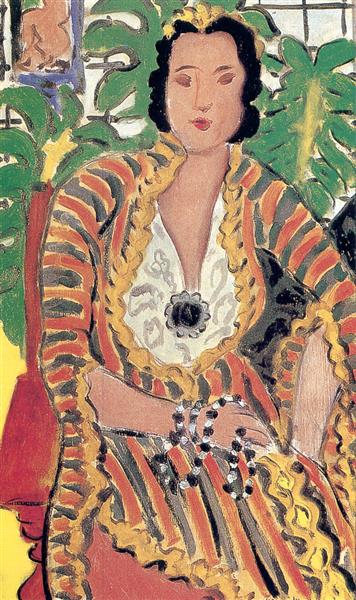Description
"Helen with a Precious Stone" is a 1937 painting by the French artist Henri Matisse, a work that encapsulates the artist's ability to combine human figures with a bold use of color and form. The painting, with dimensions of 36x60 cm, reveals a seated woman, immersed in an environment that seems to be both intimate and decorative at the same time. This woman, Helen, is the central focus, presenting a serene face and an expressiveness captured with Matisse's characteristic minimalist style.
The work is distinguished by the vibrant color palette that Matisse masterfully employs. The strong and defined contours of Helen's figure contrast gently with a background that does not distract but rather frames the central figure with a subtle visual hierarchy. The warm tone of Helen's dress and the hues of her skin are in clear dialogue with the background, creating a sense of cohesion and warmth. Matisse, known for his tendency towards Fauvism, demonstrates here his ability to reduce forms to their simplest essences without losing any of the emotional richness.
The detail of the "precious stone," which apparently gives the work its title, is found in her left hand. This detail may go unnoticed due to the subtlety with which Matisse incorporates it into the whole, reminding us of the depth and complexity of his compositions, where even the smallest details hold significant importance. This stone not only stands out for its simple presence but also for its symbolic connotation, possibly suggesting the internal richness of the subject or, on a more abstract level, the intrinsic value of form and color itself.
Beyond this specific work, it is important to reflect on how "Helen with a Precious Stone" fits into Matisse's general corpus. During the 1930s, Matisse experienced an important evolution in his art, handling a synthesis of naturalism and abstraction that would be key in his later work. The masterful use of primary and secondary colors in this painting is a reflection of his innovative approach. Similarly, the way Matisse interprets the human figure without resorting to strict realism underscores his intention to capture the essence rather than mere appearance.
Throughout his career, Matisse maintained a dynamic relationship with his contemporaries, showing himself as both an innovator and a translator of the most essential emotions through color and line. Many of his similar pieces, such as "The Dance" or "The Music," apply principles that are also noted in "Helen with a Precious Stone"; the simplification of forms, the vigorous use of color, and the crafting of a balance between background and figure are traits that hold a stylistic continuity in his work.
Observing "Helen with a Precious Stone," one not only witnesses an intrinsically beautiful piece of art but also faces Matisse's genius: his ability to be modernly innovative and eternally classic, in an image that is both simple and full of life and meaning.

